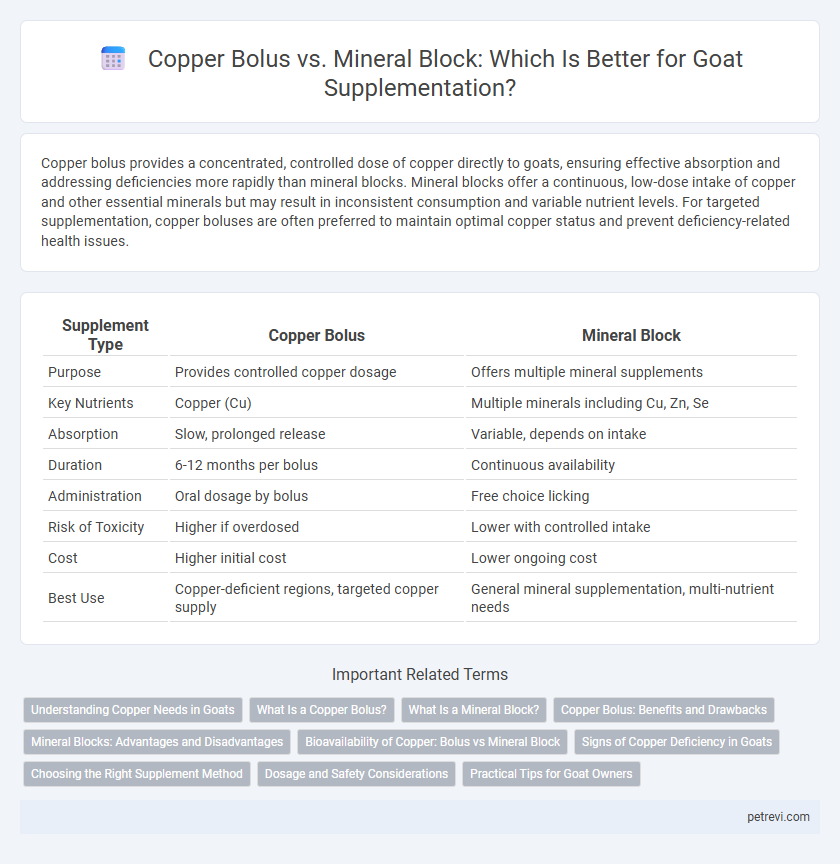Copper bolus provides a concentrated, controlled dose of copper directly to goats, ensuring effective absorption and addressing deficiencies more rapidly than mineral blocks. Mineral blocks offer a continuous, low-dose intake of copper and other essential minerals but may result in inconsistent consumption and variable nutrient levels. For targeted supplementation, copper boluses are often preferred to maintain optimal copper status and prevent deficiency-related health issues.
Table of Comparison
| Supplement Type | Copper Bolus | Mineral Block |
|---|---|---|
| Purpose | Provides controlled copper dosage | Offers multiple mineral supplements |
| Key Nutrients | Copper (Cu) | Multiple minerals including Cu, Zn, Se |
| Absorption | Slow, prolonged release | Variable, depends on intake |
| Duration | 6-12 months per bolus | Continuous availability |
| Administration | Oral dosage by bolus | Free choice licking |
| Risk of Toxicity | Higher if overdosed | Lower with controlled intake |
| Cost | Higher initial cost | Lower ongoing cost |
| Best Use | Copper-deficient regions, targeted copper supply | General mineral supplementation, multi-nutrient needs |
Understanding Copper Needs in Goats
Goats require copper supplementation to support enzymatic functions, immune health, and wool quality, but their copper tolerance varies significantly by breed and region. Copper boluses provide a controlled, slow-release dosage that minimizes toxicity risks compared to free-access mineral blocks, which can lead to overconsumption. Monitoring copper levels in blood and liver tissue is essential to optimize supplementation strategies and prevent deficiencies or toxicity in goats.
What Is a Copper Bolus?
A copper bolus is a specially designed oral supplement that slowly releases copper into a goat's digestive system, ensuring steady absorption of this essential trace mineral. It provides a controlled, long-term solution to prevent copper deficiency, which is crucial for maintaining healthy coat, growth, and immune function in goats. Unlike mineral blocks, which can result in inconsistent intake, copper boluses deliver precise dosages tailored to the goat's nutritional needs.
What Is a Mineral Block?
A mineral block is a solidified supplement containing essential trace minerals such as copper, zinc, selenium, and manganese, designed to support goats' nutritional needs by allowing free-choice intake. Unlike copper boluses, which deliver a concentrated dose of copper over time, mineral blocks provide a balanced mix of minerals crucial for maintaining metabolic functions, immune health, and overall growth. Proper use of mineral blocks helps prevent mineral deficiencies and promotes sustained dietary supplementation without the risk of overdose associated with copper bolus use.
Copper Bolus: Benefits and Drawbacks
Copper bolus offers targeted and controlled release of copper, ensuring consistent absorption and preventing copper toxicity in goats. It enhances immune function, growth, and reproduction more effectively than mineral blocks due to precise dosage delivery. However, drawbacks include the need for administration by a skilled person and potential gastrointestinal irritation if improperly dosed.
Mineral Blocks: Advantages and Disadvantages
Mineral blocks for goat supplementation provide a controlled intake of essential nutrients like copper, phosphorus, and zinc, promoting optimal growth and health while reducing the risk of toxicity associated with over-supplementation. They offer convenience, easy storage, and durability in various environmental conditions, making them suitable for extensive grazing systems. However, mineral blocks may result in inconsistent consumption due to varying individual goat preferences and environmental factors, potentially leading to nutrient deficiencies or imbalances.
Bioavailability of Copper: Bolus vs Mineral Block
Copper boluses provide a controlled, slow-release dose of copper, enhancing bioavailability by maintaining consistent copper levels in the goat's system. In contrast, mineral blocks rely on voluntary intake, which can lead to fluctuating copper absorption and potentially lower bioavailability. Studies show that boluses ensure more effective and sustained copper supplementation, reducing the risk of deficiency in goats.
Signs of Copper Deficiency in Goats
Signs of copper deficiency in goats include anemia, faded coat color, brittle wool, impaired growth, and increased susceptibility to infections. Copper bolus supplementation delivers a precise, controlled dose of copper, ensuring rapid correction of deficiencies, while mineral blocks provide a more gradual copper intake but may result in inconsistent consumption. Monitoring clinical symptoms alongside serum copper levels is essential for effective management of copper status in goat herds.
Choosing the Right Supplement Method
Choosing the right supplementation method for goats depends on their specific nutritional needs and grazing conditions. Copper boluses provide a controlled, slow-release dose of copper essential for preventing deficiencies, especially in areas with copper-poor soil, while mineral blocks offer a broader spectrum of trace minerals and allow goats to self-regulate intake based on appetite and mineral status. Evaluating factors such as ease of administration, cost-effectiveness, and the risk of toxicity is crucial to optimizing goat health through proper supplementation.
Dosage and Safety Considerations
Copper bolus provides a controlled, slow-release dosage of copper tailored to goats' specific needs, reducing the risk of toxicity compared to mineral blocks, which can lead to inconsistent intake and potential overdose. Mineral blocks offer variable copper levels that depend on individual goat consumption, making precise dosage management challenging and increasing the possibility of copper deficiency or toxicity. Safety considerations prioritize using a copper bolus to maintain optimum copper status in goats, especially in regions with high soil copper levels or when goats have limited access to diverse forage.
Practical Tips for Goat Owners
Copper bolus delivers a controlled, precise dosage of copper directly to goats, ensuring effective supplementation without the risk of overconsumption. Mineral blocks provide a convenient, slow-release source of multiple trace minerals but may result in inconsistent intake due to varying goat preferences. Goat owners should regularly monitor mineral levels and choose supplementation based on herd size, health status, and feeding behavior to optimize copper absorption and prevent deficiency.
Copper bolus vs Mineral block for Goat supplementation Infographic

 petrevi.com
petrevi.com